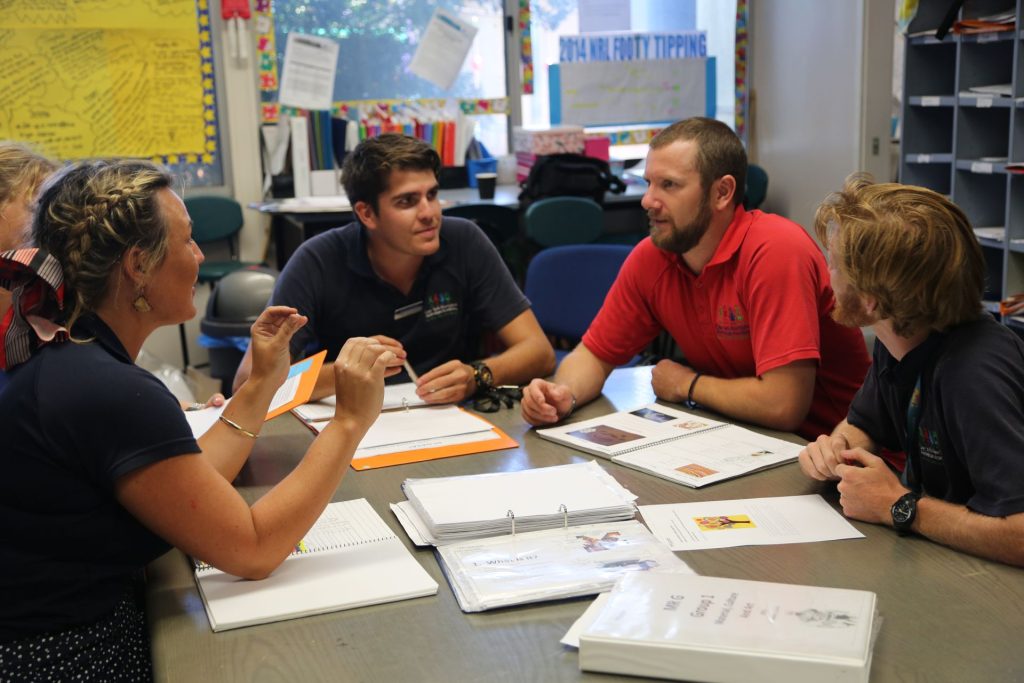Deliver Positive High Expectations Coaching
-
Module introduction5 Topics
-
Shaping a Positive High-Expectations School Culture19 Topics|4 Tests
-
C
-
Lesson Objective
-
Opening the lesson
-
Positive High Expectations
-
Shaping a positive high-expectations school culture
-
Coaching Positive High Expectations
-
Check your understanding
-
Coaching the school team
-
Effective teaching and positive high expectations
-
Using postive expectations to improve effective instruction
-
Check your understanding
-
The behaviour management team
-
Coaching the behaviour management team
-
Check your understanding
-
Structuring a sustainable and successful school culture
-
Data-based decision-making
-
Test your understanding
-
Review
-
Lesson Completed
-
C
-
Student Behaviour Management24 Topics|4 Tests
-
C
-
Lesson Objective
-
Opening the lesson
-
Positive High Expectations for All Students
-
Modelling Positive Interactions
-
Using specific positive praise throughout the day
-
Coaching the continuum of reinforcement
-
Supporting student recognition
-
Check your understanding
-
Coaching the continuum of consequences
-
Student Behavioural Data
-
Preparing Student Behavioural Data Reports
-
Practice: reviewing schoolwide behavioural data
-
Using behavioural data to improve student outcomes
-
Check your understanding
-
The Multi-Tiered System of Supports (MTSS)
-
Identifying Tier 2 Students
-
Supporting Tier 2 Students: CICO
-
Tier 2 Students: social groups
-
Managing Tier 3 Systems of Support
-
Check your understanding
-
Test your understanding
-
Review
-
Lesson Completed
-
C
-
Embedding Programs and Practices23 Topics|3 Tests
-
C
-
Lesson Objective
-
Opening the lesson
-
Positive high expectations programming
-
Designing a behaviour management model with PBIS
-
PBIS and factors of a successful Behaviour management model
-
Assembling the behaviour management team
-
Assessing the current school model
-
Check your understanding
-
Designing a common language
-
Setting up behavioural expectations
-
Scenario: revising school behavioural expectations
-
Scheduling program and practices trainings
-
Check your understanding
-
Delivering routines and expectations training
-
Coaching a best practice
-
Scenario: coaching a best practice
-
Refresher trainings
-
Coaching calendar for programs and practices
-
Leading successful refresher trainings
-
Test your understanding
-
Review
-
Lesson Completed
-
C
-
Facilitating Positive High-Expectations Trainings28 Topics|4 Tests
-
C
-
Lesson Objective
-
Opening the lesson
-
The coach as the PHE ‘Point of Contact’
-
Delivery pathways for behaviour management training
-
Building credibility in leading trainings
-
Check your understanding
-
Using positive behaviour interventions and supports (PBIS) as a framework for behaviour management training
-
Positive high expectations collegial modules and learning labs
-
Scenario: planning delivery of a positive high expectations learning lab
-
Facilitating effective teacher training
-
Learning lab format: overview
-
Learning lab format: pre-lab survey
-
Learning lab format: model, lead, test
-
Learning lab format: post-lab test
-
Check your understanding
-
Circulating during behaviour management workshops
-
Scenario: circulating during a behaviour management workshop
-
Differentiating techniques for teacher training
-
Scenario: differentiation during a learning lab
-
Check your understanding
-
Coaching behaviour management through role play
-
Scenario: coaching behaviour management techniques through roleplay
-
Using role play in teacher training
-
Assessing behaviour management practices in context
-
Test your understanding
-
Review
-
Lesson Completed
-
C
-
Coaching Positive High Expectations in the Classroom23 Topics|3 Tests
-
C
-
Lesson Objective
-
Opening the lesson
-
Classroom coaching
-
Conducting an effective teaching observation
-
Targeting behaviour management practices in observations
-
Check your understanding
-
Pre-Observation data review
-
Classroom observation
-
Preparing for a coaching session on behaviour management practices
-
Providing positive, specific, and constructive feedback
-
Scenario: using the sandwich model
-
Assigning improvement actions
-
Purpose of coaching conversations
-
Scenario: classroom coaching for positive behaviour management
-
Check your understanding
-
Coaching positive behavior management through demonstration
-
Scenario: demonstration model
-
Demonstrations
-
Tools for in-class coaching on positive behaviour management
-
Test your understanding
-
Review
-
Lesson Completed
-
C
-
Using Behaviour Data for Decision-Making23 Topics|3 Tests
-
C
-
Lesson Objective
-
Opening the lesson
-
Data driven decision-making in positive high expectations schools
-
Coaching with the behaviour management plan
-
How to develop and maintain a successful behaviour management plan
-
Coaching with effective data systems
-
Completing record forms
-
Leading the behaviour management team in data based decision-making
-
Analysing student behaviour data
-
Scenario: data based decision-making with the behaviour management team
-
Check your understanding
-
Coaching the procedures for collecting student behaviour data
-
Coaching the Use of Student Behaviour Data: Positive Behaviour Data Systems
-
Scenario: coaching the use of positive student behaviour data systems
-
Using Behaviour Data to Lead a Positive High Expectations School
-
Check your understanding
-
Evaluating teacher implementation fidelity data
-
Evaluating school wide implementation fidelity
-
Sharing data results
-
Test your understanding
-
Review
-
Lesson Completed
-
C
-
Coaching on the Behaviour Management Team24 Topics|3 Tests
-
C
-
Lesson Objective
-
Opening the lesson
-
The behaviour management team
-
Responsibilities of the behaviour management team
-
The behaviour management team
-
Behaviour management team meeting roles
-
Planning behaviour management team meetings
-
Setting meeting norms
-
Check your understanding
-
Running a behaviour management team meeting: the big 5 for tier 1
-
Running a behaviour management team meeting: action planning
-
Scenario: action planning for tier 1 interventions
-
Running a behaviour management meeting: tiers 2 and 3 action planning
-
Video: Understanding Tier 2/3 Interventions and Supports
-
Scenario: tier 2/3 action planning
-
Running a behaviour management team meeting: reflection time
-
Check your understanding
-
Other responsibilities of the behaviour management team
-
Tips for coaching a behaviour management team
-
Behaviour management team training
-
Test your understanding
-
Review
-
Lesson Completed
-
C
-
Tracking Tiered Interventions and Supports School-wide24 Topics|3 Tests
-
C
-
Lesson Objective
-
Opening the lesson
-
Continuous improvement and positive high expectations
-
Monitoring implementation and tracking improvement
-
Tracking a multi-tiered system of supports (MTSS)
-
The cycle of continuous behaviour improvement
-
Managing continuous improvement for behaviour school-wide
-
Check your understanding
-
Tier 1: Identifying and designing interventions
-
Tier 1: Determining measures for evaluation
-
Tier 1: Tracking student behaviour
-
Tier 1: Interpreting data and adjusting interventions
-
Systematic fading of a behaviour intervention
-
Scenario: Tracking, interpreting, and adjusting tier 1 interventions
-
Check your understanding
-
Tier 2/3: Identifying and designing interventions
-
Tier 2: Measuring interventions and supports
-
Tier 2/3: Tracking student behaviour
-
Tier 2/3: Interpreting and adjusting interventions
-
Scenario: Tracking, interpreting, and adjusting a tier 2 intervention
-
Test your understanding
-
Review
-
Lesson Completed
-
C
-
Coaching Tier 3 Interventions and Supports25 Topics|3 Tests
-
C
-
Lesson Objective
-
Opening the Lesson
-
Understanding Tier 3 Behaviour and Supports
-
Tier 3 Team Readiness Evaluation
-
Tier 3 Systems and Practices of the Behaviour Management Team
-
Key Practices for Designing Tier 3 Supports
-
The tier 3 core team
-
Check your understanding
-
Functional Behaviour Assessment (FBA)
-
Functional Behaviour Assessment (FBA) Steps 1 – 2
-
Functional Behaviour Assessment (FBA) Step 3: Records Review
-
Functional Behaviour Assessment Step 4: Context Analysis
-
Prioritising problem behaviours for an individual behaviour plan
-
FBA step 5: the A-B-C summary statement
-
Understanding the antecedent, behaviour, and consequence (A-B-C) model for effective behaviour analysis
-
Functional behaviour assessment part 6: conducting an observation
-
Check your understanding
-
Developing the individual behaviour plan
-
Setting up tier 3 interventions
-
Scenario: setting up tier 3 interventions
-
Interpreting and adjusting tier 3 interventions
-
Test your understanding
-
Review
-
Lesson Completed
-
C
-
Supporting Student Behaviour Through Community Partnerships25 Topics|4 Tests
-
C
-
Lesson Objective
-
Opening the lesson
-
Positive high expectations and cycle 7: school improvement partnership
-
Coaching school improvement partnerships
-
The family engagement checklist
-
Importance of schools partnering with the community
-
Check your understanding
-
Engagement routine: community forums
-
Building a common language for behaviour
-
Delivering school improvement reports
-
Scenario: sharing behaviour reports at a community school improvement partnership meeting
-
Check your understanding
-
Standardising parent engagement routines
-
Engagement routines: developing a parent engagement plan
-
Engagement routines: contacting parents
-
Engagement routines: parent-teacher meetings
-
Check your understanding
-
Community engagement on the behaviour management team
-
Engaging parents on individual behaviour plans
-
Engaging the community in school values events
-
Strengthening school-community partnerships through school-wide events
-
Test your understanding
-
Review
-
Lesson Completed
-
C
-
Supporting Positive Parent Classroom Engagement21 Topics|3 Tests
-
C
-
Lesson Objective
-
Opening the lesson
-
Positive high expectations in parent classroom engagement
-
Coaching expectations for parent-teacher communication
-
Policies for positive parent-teacher contact: emails
-
Policies for positive parent-teacher contact: phone calls
-
Parent-teacher communication in positive high-expectations schools
-
Check your understanding
-
Coaching conversations around behaviour
-
Guide to having influencing conversations with parents
-
Coaching strategic conversations during meetings on student behaviour
-
Scenario: three R’s behaviour conversation
-
ABCD model for behaviour conversations
-
Holding an influencing conversation with parents
-
Check your understanding
-
Supporting classroom visits
-
Increasing positive contact with parents
-
Test your understanding
-
Review
-
Lesson Completed
-
C
-
Module Review23 Topics|3 Tests
-
C
-
Lesson Objective
-
Opening the lesson
-
Shaping a positive high-expectations school
-
Essential coaching responsibilities
-
Building positive high-expectations school communities
-
Coaching student behaviour management
-
Embedding programs and practices of the behaviour management model
-
Check your understanding
-
Facilitating positive high-expectations training
-
Classroom coaching
-
Using behaviour data for decision-making
-
Coaching on the behaviour management team
-
Check your understanding
-
Tracking tiered interventions
-
Developing and supporting tiers 2 and 3 interventions
-
Understanding tier 2/3 interventions and supports
-
The functional behaviour assessment (FBA)
-
Coaching community partnerships
-
Supporting parent engagement
-
Test your understanding
-
Review
-
Lesson Completed
-
C
-
Module evaluation survey1 Topic
Participants 97

Managing Tier 3 Systems of Support
Students in need of Tier 3 interventions require intensive, individualised supports. Tier 3 strategies often work for students with developmental disabilities, autism, and emotional and behavioural disorders. These supports can prove effective for addressing dangerous and often highly disruptive behaviours that create barriers to learning and exclude students from social settings.

Supporting the Tier 3 Team
In smaller schools, the BMT may serve Tier 1, 2 and 3 students. In larger schools, students in need of Tier 3 interventions may be supported by individualised student teams with a focus on screening, planning IBPs, and monitoring progress towards each Tier 3 student’s social, emotional and behavioural goals.
In either case, teams managing students in need of Tier 3 supports should include a coach with training and expertise in the following:
- conducting functional behaviour assessments (FBAs) for students with intense behavioural challenges
- designing and implementing comprehensive individual behaviour plans (IBPs)
- leading interdisciplinary teams in the development of function-based support
- coaching general and special education staff who support students with Tier 3 needs
- collecting and analysing behavioural data for decision-making.
Identifying and Supporting Tier 3 Students
After initial selection by reviewing weekly green–yellow–red zone behavioural data, teacher nominations, parent and support service recommendations and screening instrument scores, students in need of Tier 3 interventions receive a functional behaviour assessment (FBA), which allows the BMT (or Tier 3 team) to identify which interventions are most useful for an individual student.

